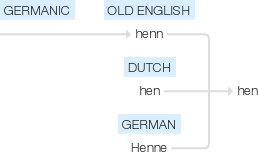Hen
Old English henn, of Germanic origin; related to Dutch hen and German Henne .
wiktionary
From Middle English hen, from Old English henn(“hen”), from Proto-West Germanic *hannju, from Proto-Germanic *hanjō(“hen”), from Proto-Indo-European *kan-, *kana-(“to sing”).
Cognate with Dutch hen(“hen”), West Frisian hin(“hen”), German Low German Heen(“hen”), German Henne(“hen”), Icelandic hæna(“hen”), Danish høne(“hen”), Swedish höna(“hen”). Related also to Old English hana(“cock, rooster”).
From Middle English henne, heonne, hinne, from earlier henene, heonenen, henen, from Old English heonan, hionan, heonane, heonone(“hence, from here, away, from how”), from Proto-Germanic *hina, *hinanō(“from here”), from Proto-Indo-European *ḱe-, *ḱey-(“this, here”). Cognate with Dutch heen(“away”), German hin(“hence, from here”), Danish hen(“away, further, on”). See also hence.
From hen(“hence, away”), or a variant of hench.
etymonline
hen (n.)
"the female of the domestic fowl," Old English henn "hen," from West Germanic *hannjo (source also of Old Frisian henn, Middle Dutch henne, Old High German henna), fem. of *hanan- "male fowl, cock" (source of Old English hana "cock"), literally "bird who sings (for sunrise)," from PIE root *kan- "to sing."
The original masculine word survives in German (Hahn "cock"), Swedish, Danish, etc. German also has a generic form, Huhn, for either gender of the bird. Extension to "female of any bird species" is early 14c. in English.
Hen as slang for "woman" dates from 1620s; hence hen party "gathering of women," first recorded 1887. To be mad as a wet hen is from 1823, but the figure was used to indicate other states: As wanton as a wet hen is in "Scots Proverbs" (1813). Among Middle English proverbial expressions was nice as a nonne hen "over-refined, fastidiously wanton" (c. 1500); to singen so hen in snowe "sing miserably," literally "sing like a hen in snow" (c. 1200). The figure of the hen with one chick dates to 1590s. Hen's teeth as a figure of scarceness is attested by 1838.
Some, on the contrary, are viciously opposite to these, who act so tamely and so coldly, that when they ought to be angry, to thunder and lighten, as one may say, they are no fuller of Heat, than a wet Hen, as the Saying is; .... ["Life of Mr. Thomas Betterton," London, 1710]
Orth. Out upon you for a dastardly Fellow; you han't the Courage of a wet Hen. ["A Sermon Preached at St. Mary-le-Bow, March 27, 1704"]
